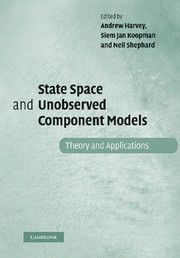Book contents
- Frontmatter
- Contents
- Preface
- Acknowledgements
- Part I State space models
- 1 Introduction to state space time series analysis
- 2 State structure, decision making and related issues
- 3 An introduction to particle filters
- Part II Testing
- Part III Bayesian inference and bootstrap
- Part IV Applications
- References
- Author index
- Subject index
1 - Introduction to state space time series analysis
Published online by Cambridge University Press: 06 January 2010
- Frontmatter
- Contents
- Preface
- Acknowledgements
- Part I State space models
- 1 Introduction to state space time series analysis
- 2 State structure, decision making and related issues
- 3 An introduction to particle filters
- Part II Testing
- Part III Bayesian inference and bootstrap
- Part IV Applications
- References
- Author index
- Subject index
Summary
Abstract
The paper presents a broad general review of the state space approach to time series analysis. It begins with an introduction to the linear Gaussian state space model. Applications to problems in practical time series analysis are considered. The state space approach is briefly compared with the Box–Jenkins approach. The Kalman filter and smoother and the simulation smoother are described. Missing observations, forecasting and initialisation are considered. A representation of a multivariate series as a univariate series is displayed. The construction and maximisation of the likelihood function are discussed. An application to real data is presented. The treatment is extended to non-Gaussian and nonlinear state space models. A simulation technique based on importance sampling is described for analysing these models. The use of antithetic variables in the simulation is considered. Bayesian analysis of the models is developed based on an extension of the importance sampling technique. Classical and Bayesian methods are applied to a real time series.
Introduction to state space models
Basic ideas
The organisers have asked me to provide a broad, general introduction to state space time series analysis. In the pursuit of this objective I will try to make the exposition understandable for those who have relatively little prior knowledge of the subject, while at the same time including some results of recent research. My starting point is the claim that state space models provide an effective basis for practical time series analysis in a wide range of fields including statistics, econometrics and engineering.
Information
- Type
- Chapter
- Information
- State Space and Unobserved Component ModelsTheory and Applications, pp. 3 - 25Publisher: Cambridge University PressPrint publication year: 2004
Accessibility standard: Unknown
Why this information is here
This section outlines the accessibility features of this content - including support for screen readers, full keyboard navigation and high-contrast display options. This may not be relevant for you.Accessibility Information
- 9
- Cited by
